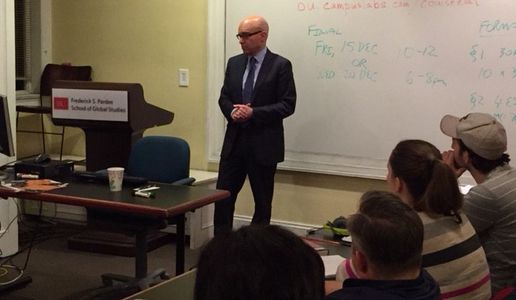Experts Discuss Homeland Security in Boston with Pardee Students

Peter K. Levitt, an attorney with the Boston firm of Donnelly, Conroy, & Gelhaar, and Michele McPhee, a Boston-based investigative journalist, visited the Frederick S. Pardee School of Global Studies at Boston University on December 6, 2017 to give presentations to students in IR 516, Intelligence and Homeland Security, a graduate seminar taught by John D. Woodward, Jr., Professor of the Practice of International Relations at the Pardee School.
Until earlier this year, Mr. Levitt, (BU Law 1995) spent seventeen years as an Assistant U.S. Attorney in Boston prosecuting organized crime, gang, drug, and health care fraud cases. He discussed with Pardee School students his work in prosecuting violent gangs, such as MS-13, 18th Street, and the Latin Kings.
As the Chief of the U.S. Attorney’s Organized Crime and Gang Unit for five years, Mr. Levitt oversaw a prosecution that led to an unprecedented sixty MS-13 members in the Boston area being charged with various serious crimes, including six murders and 22 attempted murders. In developing cases against these gangs, he stressed the importance of human intelligence, which is usually generated by confidential informants and cooperating witnesses that local law enforcement is able to develop and recruit. He also noted the sad irony that minors who try to escape gang-related violence in Central America by entering the U.S. are frequently the targets of gang recruitment when they are resettled with family members in Boston.
Kara Enoch, a Pardee School junior taking the seminar, said “Peter Levitt had an exceptional career. His impact regarding his investigations and prosecutions against violent gangs is nothing short of amazing and has inspired me to follow a similar career path.”

Michele McPhee, a Boston-based investigative journalist, discussed her book, Maximum Harm: The Tsarnaev Brothers, the FBI, and the Road to the Marathon Bombing. With the 9/11 attacks as background, McPhee described the events of, and after, the Boston Marathon bombing, which she reported on from the initial bombing through the trial of Dzhokar Tsarnaev. She began by discussing the horrific nature of the attack, reminding the audience that the attack directly impacted the Boston University community — Lingzhi Lu, a BU graduate student, was among those killed, and another BU student was badly wounded. In her presentation, McPhee offered her theory of the case and answered student questions about the terrorist attack and subsequent investigation.
McPhee also commended the important work done by Mr. Levitt, who led a team that established that Dzhokar Tsarnaev obtained the gun used to kill MIT police officer Sean Collier. In McPhee’s view, clearly establishing the fact that Dzhokar planned and procured the murder weapon made him much less sympathetic to the jury.
Laura Wiggins a Pardee School graduate student, noted, “Overall I found it very interesting the juxtaposition of Mr. Levitt’s work to protect the identity of Confidential Informants and Ms. McPhee’s work to uncover whether or not Tamerlan Tsarnaev, one of the Boston Marathon bombers, was a Confidential Informant himself for the U.S. Government.” She continued, “The U.S. is fighting a globally-connected threat of violence at home. Both Levitt and McPhee emphasized the merit of CIs in thwarting this threat. They also addressed the necessity that federal agencies and state and local law enforcement work better together to thoroughly address crime.”